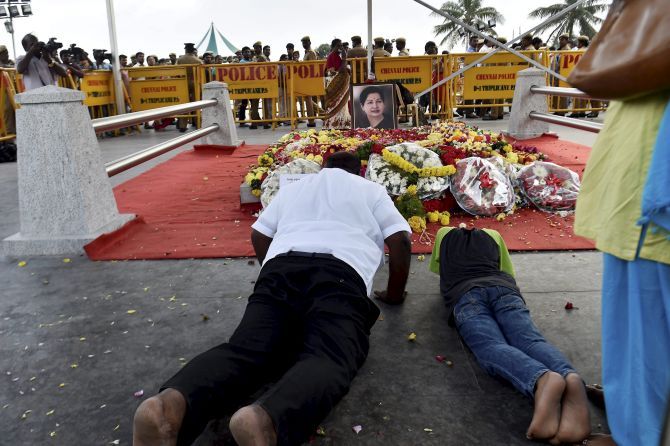The political stability that Tamil Nadu saw under Chief Minister Jayalalithaa may be a thing of the past, as the new administration struggles to find its feel, says R Rajagopalan.

A political scenario is fast emerging in Tamil Nadu which will be a replica of an earlier, federal era, like what prevailed during the Chaudhary Charan Singh and Chandra Shekhar-Inder Gujral governments, when uncertainty prevailed in the air and the governments did not last long, say political observers.
Which is surprising, because in the state assembly elections held in May this year, the All India Anna Dravida Munnetra Kazhagam emerged with 135 seats out of 232 (elections from two seats were countermanded), riding on its leader Jayalalithaa’s unmatched charisma. The party won all the three byelections from the state last month, pushing its tally to 137 (one of the bypolls was caused by the death of its MLA). Now post Jayalalithaa’s death, it has a healthy 136 seats in the House, but its problems may have just begun.
The party may have tided over the immediate crisis with O Panneerselvam’s election as chief minister shortly after Jayalalithaa’s death was announced late on Monday night, but the question still remains: Can Sasikala control the Thevar caste dominated AIADMK which also has a strong presence of other OBC communities like Nadars and Gounders?
Jayalalalithaa’s unmatched stature united almost all castes and communities in Tamil Nadu, but with her passing away district- and panchayat-level political parties will once again try and arouse castiest feelings and weaken the AIADMK’s hold.
Given this, while Panneerselvam will be presiding over a seemingly stable administration, he will need to be prepared for turbulence any time, at least for the first six months.
What makes things difficult for the AIADMK is the strong presence of its rival, the DMK which, along with ally Congress’s 8 seats, has 96 seats, just 20 short of majority. More to the point, the DMK cadre is intact, and firmly behind its leadership. Further, while the AIADMK right now lacks a charismatic leader, the DMK clearly has one in M K Stalin.
Is there a possibility of national parties the Bharatiya Janata Party and Congress trying to cash in, in the event of AIADMK cadres trying to get closer to district level parties and whereby the state government gets weakened?
Due to the tough stand taken by both the national parties over the Cauvery water dispute, which went against Tamil sentiments, there is no chance of either party taking root in Tamil Nadu.
The Congress, which lost power in the state in 1967, has been nowhere in the reckoning, and its state unit is faction-ridden. And the BJP may make some noises but it is perceived as an upper caste, north-based party, though it has made some inroads into the state thanks to the 2014 Narendra Modi wave.
Jayalalitha’s passing has thus exposed the vulnerabilities the state’s polity which seems stable from the outside but is vulnerable to external shocks. She did not ensure a second line of leadership in the AIADMK, and the vacuum cannot be filled overnight.
She was lauded for the strong stance she took on the control of militancy and terrorism, as well as boosting the infrastructure development and economic growth of Tamil Nadu which, it is feared, may suffer a setback till the new dispensation finds its feet.
She had a vision for Tamil Nadu and projected it as a document for the year 2023. At the same time, she fought aggressively for enforcing the state’s rights in the Cauvery water dispute. In fact, her last letter to Prime Minister Narendra Modi was on the Cauvery. She also fought with the BJP government at the Centre on GST. She had the courage to call a spade a spade.
To carry on the good work done by her, what the state needs is a strong administration, one that makes no compromises on law and order. Will OPS measure up? Only time will tell.
Image: Former Tamil Nadu Chief Minister Jayalalithaa’s supporters paying tribute at her burial place in Chennai on December 7, 2016. Photo: R Senthil Kumar/PTI Photo.
R Rajagopalan is a senior journalist and a commentator on southern politics.











 © 2025
© 2025